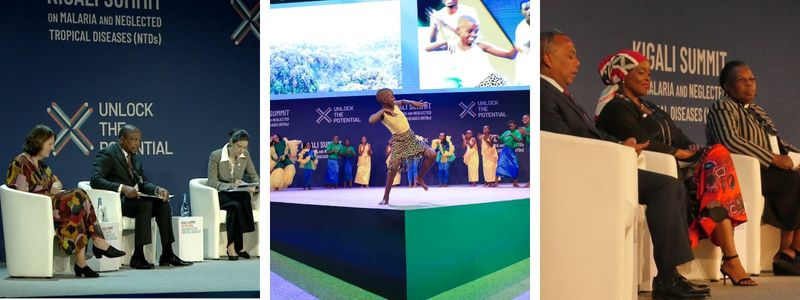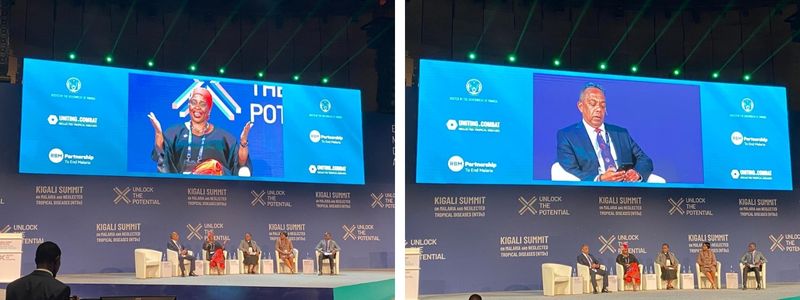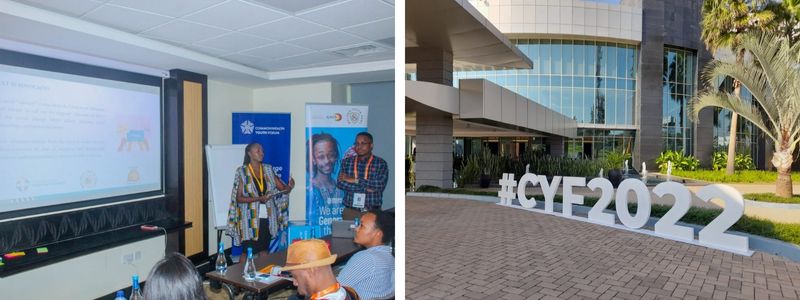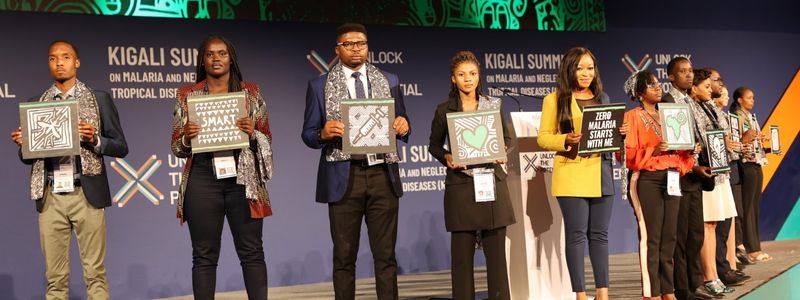July 2022 newsletter
Sign up for our newsletter
Every two months, we send the ALMA Scorecard Hub newsletter. Sign up to receive all future Scorecard Hub newsletters in your inbox.
Kigali Summit on Malaria and Neglected Tropical Diseases
Commonwealth leaders gathered in Kigali, Rwanda last week for the Commonwealth Heads of Government Meeting. Alongside this meeting was the Kigali Summit on Malaria and Neglected Tropical Diseases, hosted by the Government of Rwanda and convened by the RBM Partnership to End Malaria and Uniting to Combat NTDs.
The malaria and NTD summit was attended by heads of government, minsters of health, WHO leaders, philanthropists, the private sector, scientific experts, UN and bilaterla partners and youth and community champions.
Throughout the summit, experts discussed integrated approaches, the importance of continued innovation and ensuring access to new tools and interventions, efficient and data driven use of existing resources and the need for sustained financing and resource mobilisation. National End Malaria Councils and the ALMA Malaria Youth Army – both priority areas in the legacy agenda of our ALMA Chair, His Excellency Uhuru Kenyatta, President of the Republic of Kenya – were highlighted at the summit as key components in the fight against malaria.

Many of those attending committed to specific actions to end malaria and NTDs. Read on to learn more…
US$ 4.5 billion
committed to accelerate progress against malaria and NTDs by governments, international organisations, philanthropists and the private sector
Ensuring that all African countries mobilise the domestic financial resources required for quality healthcare, is a priority for the African Union, and our partners. If there is one thing the pandemic has taught us, it is that together, through coordinated and collaborative action, we can achieve much more.
His Excellency Paul Kagame, President of the Republic of Rwanda
Action and leadership from malaria-endemic countries
This summit was an important milestone ahead of the seventh replenishment for the Global Fund to Fight AIDs, Tuberculosis and Malaria later this year.
The Global Fund is aiming to raise at least US$ 18 billion in this replenishment. A successful replenishment could cut malaria deaths by 62%, reduce malaria cases by 66% and eliminate malaria from 6 more countries by 2026. Since the creation of the Global Fund, they have invested more than US$ 16 billion in malaria control programmes.
During the summit, malaria-endemic countries demonstrated their leadership by committing $2.18 billion in domestic funding for 2022 and 2023 as part of their Global Fund counterpart funding and encouraged other countries and partners to join them. Countries also demonstrated their commitment to malaria during the COVID-19 pandemic, prioritising life saving campaigns and working to ensure malaria case management was prioritised. They called on partners at all levels to demonstrate global solidarity and ensure that the Global Fund replenishment targets are achieved.
It is encouraging to see that leaders of the Commonwealth will discuss and pledge their support for this campaign and are committed to work towards ending the epidemic of malaria by 2030. I very much welcome this determination and that we are not turning our back on a job unfinished.
His Royal Highness The Prince of Wales
Kigali Declaration on Neglected Tropical Diseases
His Excellency Paul Kagame, President of the Republic of Rwanda, launched the Kigali Declaration on Neglected Tropical Diseases to galvanise all stakeholders to deliver the WHO NTD roadmap for 2021 to 2030. The declaration has been signed by dozens of world leaders, donors, private sector and pharmaceutical companies and civil society organisations.
US$ 1.9 billion
in financial commitments on NTDs
18bn tablets
donated by 9 industry partners
US$ 562 million
worth of other health products
While these commitments will contribute to achieving the roadmap, more commitments are still needed to realise the ambitions in the WHO NTD roadmap.
Learn more about the Kigali Declaration on Neglected Tropical Diseases
All stakeholders commit to ending the scourge of malaria and NTDs
During the summit, a range of stakeholders made significant commitments in the fight against malaria and NTDs.
- Governments: Several governments commitments to domestic resources, co-financing and support for innovation.
- Private sector: Donations of drugs and health products, research funding, enhancing local manufacturing capacity, co-financing to unlock larger private sector funding were some of the commitments from the private sector.
- Trusts, funds, foundations and philanthropists: These groups made commitments to research funding, new treatments for NTDs, prevention delivery and treatment, and strengthening institutions in Africa.
- Civil society organisations: CSOs committed to support malaria and NTD programming including resource mobilisation and community engagement.
Learn more about the commitments in the summit’s outcome statement (PDF)
End Malaria Councils and Funds step up efforts to mobilise domestic resources to end malaria and NTDs

During the Kigali Summit, members of End Malaria Councils and Funds (EMC/Fs) from Kenya, Eswatini, Mozambique and Zambia called for increased multi-sectoral collaboration, particularly from the domestic private sector to intensify interventions in the fight against malaria. At the same time, the five active End Malaria Councils and Funds (including Malaria Free Uganda, which was unable to participate in the summit) announced a commitment to mobilise US$ 100 million to support malaria control and elimination.
ALMA is working with governments across highly impacted countries to raise additional resources in the malaria and NTDs fight. 25 countries in Africa are in the process of establishing national End Malaria Councils and Funds to drive multisectoral support for the fight against malaria and in some cases NTDs. Between 2021 and 2022, EMCs have mobilised millions of dollars in financial and in-kind support toward the fight against malaria.
The councils and funds joined some of the most influential voices in the global health space including world leaders, philanthropists, scientific experts, global experts and community champions gathered at the Kigali Summit on Malaria and Neglected Tropical Diseases (NTDs) in making bold commitments to eliminate malaria and NTDs by 2030. Collectively, stakeholders at the summit pledged over US$ 4 billion in funding to renew commitments toward ending malaria and NTDs by 2030.
Learn more about End Malaria Councils and Funds
Commonwealth youth commit to build a strong network to advocate for malaria elimination
Workshop on social media for health advocacy
Ahead of the Kigali Summit on Malaria and NTDs, the ALMA Youth Advisory Council, Malaria Youth Armies from Kenya and Rwanda alongside partners from the Medical Students Association of Rwanda and Malaria No More UK met with other youth leaders at the Commonwealth Youth Forum for a social media for health advocacy workshop.

Now more than ever before is the time for increased political will and leadership to deliver on the promise to halve malaria deaths and cases in the Commonwealth and solve the problems that impede progress on NTDs. As young people we are providing that leadership to ensure that political commitments are translated into action.
Aloyce Urassa, the Chair of the ALMA Youth Advisory Council
The workshop included advocacy for policy and social change, and a quick-fire session where young people looked at successful social media campaigns implemented by youth advocates. The meeting also included an ideas lab that was an open forum to discuss social media campaign ideas by participants.
Spotlight on malaria
In support of Malaria No More’s second phase of the Draw the Line Against Malaria campaign, members of the ALMA Youth Advisory Council as well as the Kenya and Rwanda Malaria Youth Armies joined other advocates in delivering a call to action to world leaders to urgently act against malaria. Youth champions delivered this message at the Kigali Summit on Malaria and NTDs on 23 June.

Building partnerships to strengthen the fight against malaria
On the sidelines of CHOGM, the ALMA Youth Advisory Council, accompanied by members of the Kenya Malaria Youth Army, met key representatives from the Commonwealth Secretariat’s youth team to discuss opportunities for collaboration beyond the Commonwealth Youth Forum. During the meeting, priority agenda – both from AYAC and the Commonwealth – were presented, highlighting areas of alignment. As a next step, the AYAC team will deliver a proposal on concrete areas of collaboration for sustained youth action in the fight against malaria within Africa and Commonwealth countries.
Learn more about ALMA’s youth engagement
Commonwealth data on the Scorecard Hub
Enhancing data-driven decision-making will play a key role in beating malaria and NTDs. The Scorecard Hub provides a platform for African countries to share health scorecard data and best practices.
Learn about the Commonwealth Malaria Tracker and how it is helping Commonwealth countries monitor progress on their 2018 commitment to reduce malaria incidence and malaria mortality by 50% by 2023.
10 African Commonwealth countries share health scorecard data on the Scorecard Hub (across malaria, NTDs and RMNCAH [reproductive, maternal, newborn, child and adolescent health]):
Sign up for our newsletter
Every two months, we send the ALMA Scorecard Hub newsletter. Sign up to receive all future Scorecard Hub newsletters in your inbox.